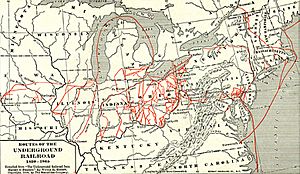Hart Leavitt facts for kids
Hart Leavitt (born December 19, 1809 – died 1881) was an important person from Massachusetts. He was a merchant, owned land, and served in the government. Most importantly, he was a strong abolitionist, meaning he worked to end slavery.
Hart and his brother, Roger Hooker Leavitt, ran a secret "station" for the Underground Railroad in Charlemont, Massachusetts. They helped enslaved people escape to freedom. Their other brother, Joshua Leavitt, who lived in New York, also helped. The homes of Hart and Roger Hooker Leavitt are now recognized by the National Park Service as part of the Underground Railroad Network to Freedom.
Contents
Who Was Hart Leavitt?
Hart Leavitt was born in Heath, Massachusetts in 1809. His father, Roger Leavitt, was also a landowner and served in the Massachusetts government. His mother was Chloe (Maxwell) Leavitt. Hart's grandfather, Rev. Jonathan Leavitt, was a minister in Charlemont.
Hart went to Hopkins Academy, just like his brother Roger Hooker. After school, Hart focused on his family's businesses and land. He also served in local and state government roles. Later, he moved to Greenfield, where his uncle, Jonathan Leavitt, was a well-known judge. Hart Leavitt opened a store next to his uncle's law office. This store was also home to Greenfield's first newspaper and post office.
Fighting Against Slavery
Hart Leavitt and his brothers, Roger Hooker and Joshua, were deeply committed to ending slavery. In October 1835, they went to a special meeting in Utica, New York. This meeting was organized by the Utica Anti-Slavery Society. Its goal was to create the New York Anti-Slavery Society. Hart Leavitt was one of the few people there who were not from New York. Sadly, the meeting faced violence from people who supported slavery.
Hart's brother, Joshua, was already a strong abolitionist. After studying law and divinity at Yale, he became a full-time editor. He worked on publications like The Emancipator, which promoted the end of slavery and other social changes.
In December 1836, the Franklin County Anti-Slavery Society was formed. This group brought together people in the region who wanted to end slavery. Hart Leavitt, as a merchant, was a representative at this important meeting. By 1840, Hart's father, Roger, was the president of this society. He also helped start the American & Foreign Anti-Slavery Society with his son Joshua. That same year, Hart's father, Roger, ran for Lieutenant Governor of Massachusetts. He was part of the new Massachusetts Liberty Party, which was an abolitionist political party. Hart's mother, Chloe, also helped by collecting signatures for a petition. This petition demanded that slavery be ended in District of Columbia.
Helping Freedom Seekers
From the mid-1830s, Hart Leavitt became more active in politics and the fight against slavery. By the late 1830s, he was using his farm in Charlemont as a station on the Underground Railroad. This meant he secretly helped enslaved people who were escaping to freedom.
One of the most well-known people he helped was Basil Dorsey. The Leavitt family, including Hart, his two brothers, and their father, hid Dorsey from those who wanted to return him to slavery. Dorsey lived with the family for more than five years. He moved between their different homes, staying hidden in plain sight. Hart Leavitt also helped other freedom seekers on their journey to Canada. His work with the Underground Railroad was so important that a historian named Wilbur Henry Siebert listed him as a key operator in the Franklin County network. Siebert called Hart Leavitt "a sturdy abolitionist who did all he could to help slaves gain their freedom."
Public Service and Legacy
Hart Leavitt served his community in many ways throughout his life. He was a Selectman for the town of Heath for several years. He also served as a member of the Massachusetts House of Representatives. In his later life, he was a Justice of the Peace and a Franklin County Commissioner from Charlemont. During the Civil War, Hart Leavitt continued to serve as a Selectman for Charlemont.
In 1831, Hart married Mary Miller. She was the daughter of Rev. Moses Miller from Heath. Hart and Mary had six children: five sons named Edward Hart, Joseph Ware, Joshua, Roger, and Spencer Miller, and one daughter named Mary. The home where Hart and Mary Leavitt lived, located outside Charlemont, is recognized by the National Park Service as part of the Network to Freedom.
See also
 | Stephanie Wilson |
 | Charles Bolden |
 | Ronald McNair |
 | Frederick D. Gregory |


